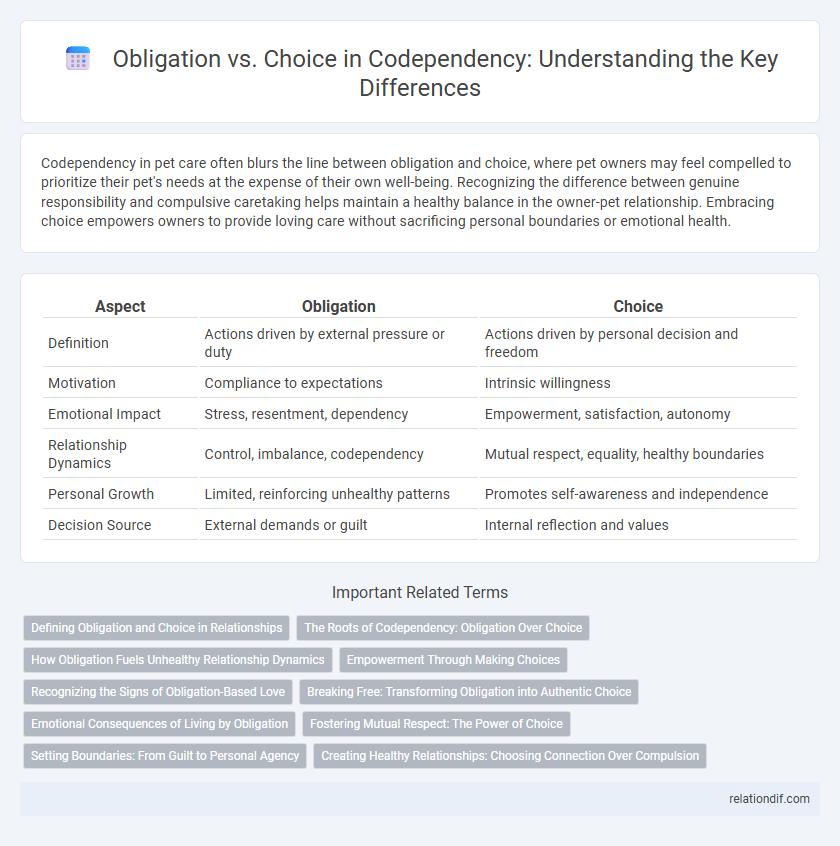Codependency in pet care often blurs the line between obligation and choice, where pet owners may feel compelled to prioritize their pet's needs at the expense of their own well-being. Recognizing the difference between genuine responsibility and compulsive caretaking helps maintain a healthy balance in the owner-pet relationship. Embracing choice empowers owners to provide loving care without sacrificing personal boundaries or emotional health.
Table of Comparison
| Aspect | Obligation | Choice |
|---|---|---|
| Definition | Actions driven by external pressure or duty | Actions driven by personal decision and freedom |
| Motivation | Compliance to expectations | Intrinsic willingness |
| Emotional Impact | Stress, resentment, dependency | Empowerment, satisfaction, autonomy |
| Relationship Dynamics | Control, imbalance, codependency | Mutual respect, equality, healthy boundaries |
| Personal Growth | Limited, reinforcing unhealthy patterns | Promotes self-awareness and independence |
| Decision Source | External demands or guilt | Internal reflection and values |
Defining Obligation and Choice in Relationships
Obligation in relationships refers to a sense of duty often driven by guilt, fear, or external pressure, leading individuals to prioritize others' needs at the expense of their own well-being. Choice, by contrast, embodies voluntary commitment based on mutual respect, personal boundaries, and genuine desire to support without losing autonomy. Understanding the distinction between obligation and choice is crucial in recognizing unhealthy codependency patterns and fostering balanced, fulfilling interpersonal connections.
The Roots of Codependency: Obligation Over Choice
Codependency stems from prioritizing obligation over choice, where individuals feel compelled to meet others' needs at the expense of their own autonomy. This dynamic often originates in dysfunctional family systems that enforce duty and sacrifice as inherent responsibilities. Understanding the roots of codependency requires recognizing how ingrained obligations suppress personal freedom and hinder healthy boundaries.
How Obligation Fuels Unhealthy Relationship Dynamics
Obligation in codependent relationships creates an unbalanced dynamic where one partner feels compelled to meet the other's needs at the expense of their own well-being. This sense of duty often leads to resentment, suppressed emotions, and a lack of genuine connection, undermining trust and mutual respect. Unlike healthy relationships based on choice and mutual support, obligation-driven interactions perpetuate control and dependency, hindering personal growth and emotional autonomy.
Empowerment Through Making Choices
Empowerment in overcoming codependency stems from recognizing the difference between obligation and genuine choice, allowing individuals to reclaim control over their decisions. By prioritizing personal boundaries and authentic desires over external demands, one fosters self-respect and emotional independence. This conscious decision-making process enhances resilience and promotes healthier relationships rooted in mutual respect rather than duty.
Recognizing the Signs of Obligation-Based Love
Obligation-based love often manifests through feelings of guilt, pressure, and a persistent need to meet others' expectations at the expense of personal well-being. Key signs include difficulty setting boundaries, sacrificing one's own desires repeatedly, and staying in relationships out of duty rather than genuine affection. Recognizing these patterns is essential for breaking free from codependency and fostering healthier, choice-driven connections.
Breaking Free: Transforming Obligation into Authentic Choice
Breaking free from codependency involves recognizing the difference between obligation and authentic choice, enabling individuals to reclaim personal power. Shifting from a mindset of obligation to one of genuine choice fosters healthier boundaries and promotes emotional independence. Embracing authentic choice empowers transformation and supports sustainable relationships grounded in mutual respect.
Emotional Consequences of Living by Obligation
Living by obligation in codependency often leads to emotional exhaustion, as individuals suppress their true feelings to meet others' expectations. This persistent self-neglect creates resentment, anxiety, and a diminished sense of autonomy. Over time, the imbalance between obligation and personal choice undermines emotional well-being and fosters chronic dissatisfaction.
Fostering Mutual Respect: The Power of Choice
Fostering mutual respect in codependency involves recognizing the power of choice rather than obligation in relationships. Emphasizing voluntary actions promotes healthy boundaries and empowers individuals to support each other without resentment. This shift from obligation to choice cultivates genuine connection and sustainable emotional balance.
Setting Boundaries: From Guilt to Personal Agency
Setting boundaries in codependent relationships shifts the focus from obligation to personal agency by empowering individuals to make conscious choices instead of feeling compelled by guilt. Establishing clear limits promotes emotional autonomy and reduces the risk of enabling unhealthy dynamics, fostering self-respect and mutual respect. This transition is crucial for breaking codependent patterns and cultivating healthier, more balanced interactions.
Creating Healthy Relationships: Choosing Connection Over Compulsion
In codependent relationships, distinguishing obligation from choice is essential for creating healthy connections built on mutual respect and autonomy. Emphasizing voluntary support rather than compulsive duty fosters emotional balance and prevents resentment or burnout. Prioritizing authentic connection encourages personal growth and sustainable relational dynamics.
Obligation vs Choice Infographic

 relationdif.com
relationdif.com